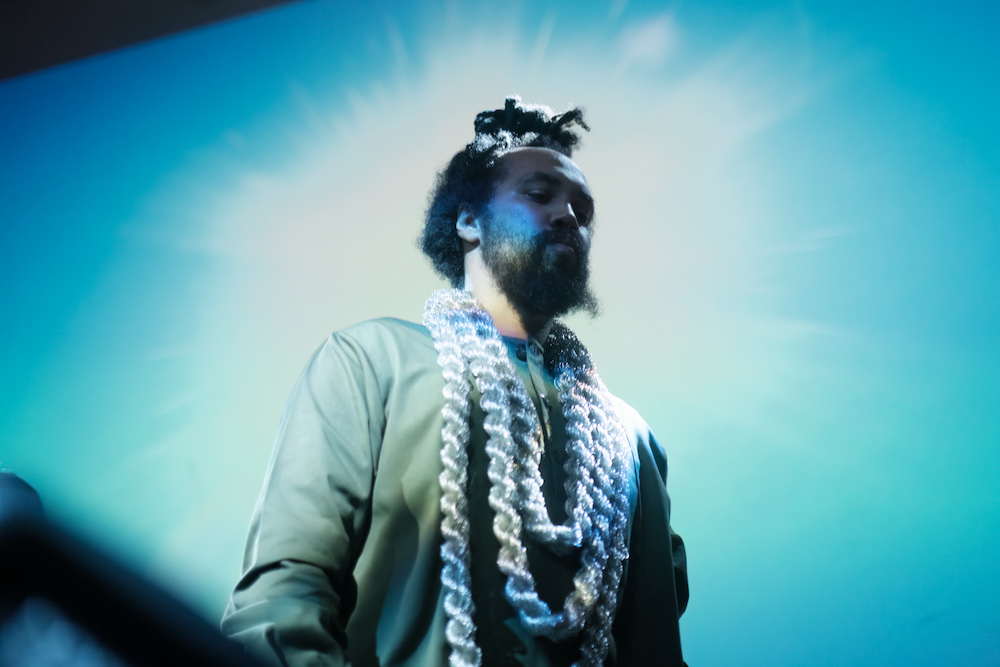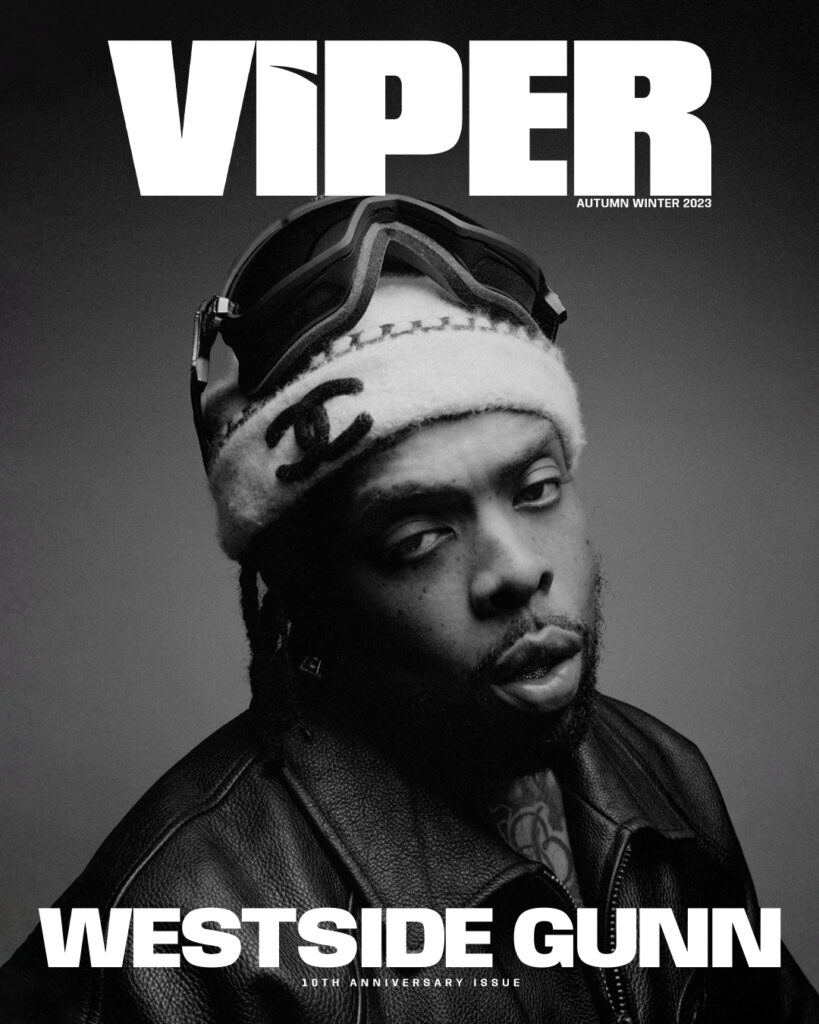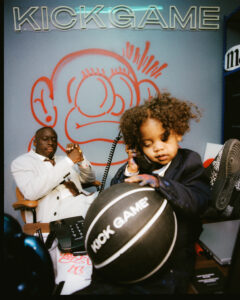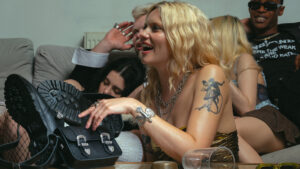Multidisciplinary artist, Apex Zero, is an emcee, producer, filmmaker, journalist and photographer born and raised in West London with Grenadian roots. Get deeper with him via his VIPER interview…
What five words define your sound?
Lyrical. In-depth. Artistic. Unrefined. Honest.
Tell me something unique about your creative process.
‘Drummer Warrior Storyteller’ is a living album. I’m trying to push the boundaries of what an album can be. It’s made of multiple parts and it’s growing – music, film, paintings, metalwork, dance, photography, theatre, workshops and more. All of them, alone or together, in any combination is the album. Every time a person listens, watches, comes to an exhibition or participates in a workshop or performance, they’re entering into the universe of the album and contributing to its life-force and growth.What really got me into Hip Hop was classic albums. The craft of building bars, beats, styles, messages, the flow from one track to the next, skits, concepts, the artwork… I used to spend hours analysing all these things on my favourite albums. What really made me vibe with Jungle, D&B, Garage and Grime was the dance, the rave, the club. I feel like with Jungle/D&B especially, the dance was more important than charting or making an album. If you could make things pop off in a rave and have people going mad, or fill up a warehouse or field, you’ve hit the highest level. That transient moment that might never happen again, like a real freestyle, is a beautiful thing. You had to be there to experience and even if it’s filmed, it ain’t the same as being there.My creative process for ‘Drummer Warrior Storyteller’ was to try and combine both of those ideas – careful, critical, precise craft and transient, momentary experiences. Mix that with the core theories that underpin it – mostly Chinua Achebe’s conception on Storytelling, ‘Habeas Viscus’ by Alexander G. Weheliye and the writing of Audre Lorde – and that’s a big part of the creative process explained.
Which song of yours would you like people to hear first?
The track I feel captures the essence of ‘Drummer Warrior Storyteller’ Is ‘This Riddim (On Ancestors)’ from Part 1. It honours and gives reverence to my people and our Ancestors, all we’ve endured and all the beauty of who we are. That’s the goal of the whole project, and that track epitomises that principle to me.
What inspired you to make that song?
I was having a rough time. A lot of people I love transitioned to the next world in a short period and I was dealing with grief while also trying to figure out some things in my life. I went for a long walk through London, then sat down outside to write. The bars came to me in one go, over about an hour. I wrote it one time, with very little editing and recorded it as an acapella. I sat with it like that for a while as the album came together, but eventually realised it needed music.I went to my studio late at night and the music just came through me too. I really feel like the whole track was given to me by The Spirit and my Ancestors, I’m just a medium to spread the message. Things like that have happened all the way through making this project, and I’m sure it’ll keep happening as it grows.
What’s the most vulnerable you’ve allowed yourself to be when writing/making music?
All through this project, I’ve had to open up more and more. It’s been a ride – mentally, physically and emotionally. It’s a labour of love and reverence. ‘You (On Love)’ is different to anything I’ve really made before. A lot of the thoughts expressed on that track are really personal and private, things I only think to myself or say to people I love. To share that with the world took a big step, I’m not the kind of person who really talks about these things to a lot of people.That carried into the film too. My sister and collaborator, Dr. Ekua McMorris, really inspired me to dig into my family history. Her photography deals with that a lot, so she pushed me to go through our family photos and home videos. I used them to draw out stories from my parents and learn more about them and our family. It was also really brave of them, my brother and my wife to agree to be in the film and put our family’s life out into the world for people to see. I’m really grateful to them all for helping to elevate the work; the vulnerability and bravery gives it power.
What’s the best/worst experience you’ve had on stage?
There’s been a lot of great ones – I love touring and performing. I’ve played some incredible events with my fam out in China; performing at a festival on a rooftop in Uganda was beautiful. But the best so far is definitely the immersive exhibition and theatre show we put on at Rich Mix in October 2022. My brother Muti Musafiri got us the platform as part of Village 101’s ‘Legacy 101’ Festival, and we put together something special.We secured Arts Council funding with four weeks to go before the event and put together an incredible team. Everyone involved went above and beyond, from the curation to performance to costume to visual effects; We went in. The time limitation meant we didn’t have time to do a full run through before the show, but with everyone’s talent and professionalism, we created this amazing space between preparation on spontaneity and magic came out of that place. We honoured our Ancestors and The Most High to the fullest, told the story of our people and really, really touched the people who came to experience it. The energy was electric and the reaction from everyone there was overwhelming. It showed me that everything I’ve lived through, the good and the bad, was to make work like that. It’s my purpose – to make work like this to improve the world for our people and inspire change.The worst almost happened at the same show. There was a moment when I was performing ‘Seventh Dimension (On Perspective)’ – that track’s a deep one and I had my eyes closed, feeling the Spirit. I was moving with the track and if I’d taken one more step I would have dropped off the stage! Luckily the Ancestors caught me and stopped that happening.
What is your favourite song to perform?
I love a lot of them. ‘Stand and Fight (On Violence)’ from ‘Drummer Warrior Storyteller (Part One)’, it’s raw and powerful and buns a Fyah that captures people. But I also love performing ‘Live Life (On Livity)’ from Part Two, featuring my sis Elia Naa. It’s uplifting, moves people and is mad fun. At the theatre show at Rich Mix, we had three incredible dancers – Corrie Onyx David King, Grace Ogundipe Akinbode and Andre Bright – they gassed me up and the energy was different. The message hits people in the heart too, it’s all about celebrating life no matter what you’ve been or are going through. I shouted out, “make some noise for your life” and everyone in there was on their feet going wild.
Which artist/song/album made you want to make music?
So many. DMX and So Solid when I was really young. I think I was just a fan of music them times, but when I heard DMX – tracks like ‘Ruff Ryder’s Anthem’ and ‘Slippin’’ I think that really made me wanna rap. To be able to pour out your heart and life like he does was captivating. That was also the Garage days though and hearing So Solid on radio and tapes my brother and friends would bring around was mad, before they were on TV or I could go to raves. They were properly from the ends and had everyone my age wanting to be like them. Between them, Heartless and Pay As You Go especially, that’s what got me spittin’ on Garage at 13/14 years old. ‘Stillmatic’ by Nas, ‘Let’s Get Free’ by dead prez and ‘Only Built for Cuban Linx’ from Raekwon and Ghostface, Wu-Tang in general, really got me fully back to Hip Hop though. I felt like the tempo, that level of depth and the craft of putting together an album as a body of work was really what I wanted to achieve as an artist. ‘The Sagas of Klashnekoff’ was the first album that really gave me the same feeling from a London emcee. There’s a lot of underground classics that heads outside our scene might not know but ‘Live in Protest’ by Manage and ‘Anathema’ by Phalanx Heresy/Triple Darkness set the level for me when I was cutting my teeth too.
What’s the meaning behind your name?
I came up in a crew called First and Last. We started doing Garage and then focused more on Hip Hop when most of the mandem did other things with their lives and there was just two of us left. For a while my name was Alpha and his was Omega, but the deeper we got into our artistry, that felt basic, so we evolved our names.I wanted my name to start with an A still, to represent that ‘first’, and Apex being the highest point aligned with that. Later, a friend of mine schooled me to the importance of Zero in maths, how all equations need to be balanced by making them equal Zero. It’s seen as nothing, but in terms of importance, it’s everything. It’s the real starting point, before one. It’s the point between positive and negative, the centre of all numbers.I looked more into it, and I’d already been getting into Supreme Mathematics, some numerology and Chinese philosophy, so the importance of balance was important to me. Mix that with the goals of creating a more balanced world, of not wanting to get caught up in the hype of capitalist extravagance, of trying to do good in the world but being willing to get my hands dirty when needed – the name just started to resonate and fit.Over the years, Apex Zero has become what I live by; strive for the highest point (Apex) of everything, even if you’re seen as nothing (Zero). The first (Zero) and the last (the Apex). I used the symbols for Infinity (two intertwined Zeros) and Pi (that looks like an A) but is a formula for a circle (a Zero) to make my logo. Both those symbols can be read as the Apex or Zero. There’s also the Biblical saying, ‘The first shall be last and the last shall be first’; Frantz Fanon says in ‘The Wretched of the Earth’ that that principle is a core aim of anti-colonial revolution, to invert the order of things. All that and more is wrapped up in my name.
If you weren’t making music, what would you be doing instead?
No idea. This is who I am. It’s my reason for being. Not only music; film, art, discussion, theorising, building, making change, studying, teaching and living my culture, paying reverence to my Ancestors as an extension of them and as a fragment of The Most High. I’m here to carry on the legacy of my Ancestors, to ensure our traditions live on and continue to develop. It’s deeper than money, or entertainment or success. It’s being, embodying, receiving and passing on torches.Music, especially lyricism and Drumming, have really led me to the ways of my people. We play Riddims that our people have beat for thousands and thousands of years. We’ve told stories over them Riddims for almost as long. Hip Hop, Grime, Drill, Jazz, Soca, Dancehall, Highlife, Afrobeats – it’s all a continuation of that tradition, our Ancestors living through us as we tell our stories for ourselves and for the next generations in our own words, regardless of the language or location. I can’t really imagine a different world-line where I don’t do this; the point of departure and divergence is too far back now! And to be real, if I was doing something else in my life – like if I’d never stopped playing football – I think I’d still be doing this in some way.
What’s success to you?
Making work that honours these traditions, work that honours the legacy of my Ancestors as craftspeople of civilisations and survivors of genocide. African people have done so much in and for this world. The hardships we face are a tiny dot in the history of our people and this planet, but we’re still in that moment. So making work that inspires people to live better – to grow and strive for more than the enemy tells us we can be – is success. To have people hear and feel my work and tell me that it helped them heal, that it changed the way they see the world or themselves, that it taught them something about our Ancestors or culture, that’s success to me.There was a point when just making the work was enough, but I’ve become more mindful as I get older that putting effort into making sure the work spreads further is important. I do what I can to share it as far as I can and find heads that it resonates with.Pushing myself to do something new, to find ways to make my work innovative and inspiring, overcoming limitations and pushing whatever boundaries I can, to grow as a person and artist, widen and deepen my skills, all of that is success. When my work takes me to new places, new countries, new spaces that people who grow up in Hounslow don’t normally get to go, that’s a huge success to me. Finding people who inspire me or who have influenced me, then getting to work with them is success to me too. I’ve managed to get to a point that the main thing I do with my life is make, show and talk about art and the ideas that underpin it and find ways to implement them in the world. I get moments where I can’t believe that’s the life I get to live and I’m fully grateful for it. That’s a huge success to me.
What moment in your life/career forced you to change direction?
Moving to China. Maybe more to the point, leaving England for a long period of time. I feel like it really helped me to purge myself of some of the ways of thinking and being that growing up here trains you in and forces on you. Living somewhere else really made me see that England, London even, ain’t the centre of the world. People all over the world don’t care or even know about some of the things that can feel massive to me here. I think going anywhere might have done this in some way, but going to somewhere as different as China really opened my eyes and gave me loads of new perspectives. It pushed me to travel more. I’m blessed to have seen a good amount of the world and experience different cultures and ways of life. It’s taught me a lot about myself and others and life. I think it also let me appreciate the things I do love about London and England, like the music and nightlife here. I took it for granted for years, but it really isn’t like this in lots of places. The music that’s been born in the ends has had a massive influence all over the world. Leaving made me appreciate it and the impact it’s had on me. That music has let me connect with people all over the world and share in a lot of cultural exchange. It’s led me to movements like End of the Weak that now connects me with a global Hip Hop community in 20 countries, with people in those countries that are now family to me. That’s an incredible gift.
Where can people keep in touch with you?
Best way is my website – www.apexzero.co.uk – all the links to everything I do are there. The only social media I really use is Instagram but email is a good way to holla too. Follow me on YouTube.
‘Drummer Warrior Story Teller Part 2’ is out now.
Photo by Akil Wilson





